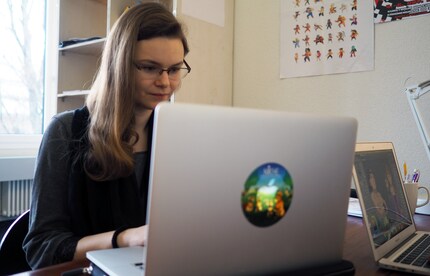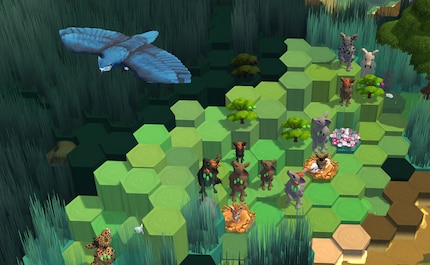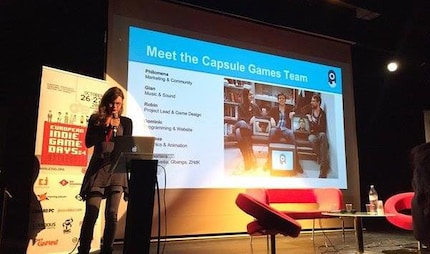
Product test
Tobii Eye Tracker: controlling games with your eyes? Is it for real?
by Philipp Rüegg

Each year, American business magazine Forbes compiles a list of the most important people in business, technology and entertainment. This year, for the first time, a Swiss game designer has made the list “30 under 30”.
Forbes is most famous for its lists of the world’s richest or most powerful people and biggest companies. Bill Gates, Angela Merkel and Beyoncé are just a few who have made the ranking. In addition, the magazine awards young people in particular in categories such as technology.
For the European list "30 under 30: Technology", Forbes selected around 45 people from countless nominees and presented them to three jurors. One of the 30 winners is 27-year-old Philomena Schwab, designer of the game “Niche – a genetics survival game” that raised 70.000 francs on Kickstarter. Schwab is one of the most active people in the Swiss game scene.
Philomena Schwab: I have no idea (laughs). I was expecting to be entered in the category Game. So it’s a bit of a surprise that I ended up in Technology. To be nominated, you need to have shown repeated commitment or have a special flagship. Like inventing the Tesla or something. In my case, the former applies. Together with a business partner, I established a company for games and it’s doing quite well. Thanks to our current game “Niche”, we’ve secured two years’ worth of work; nonetheless, I still wouldn’t call it the ultimate indie hit of 2016. Maybe the jury was impressed by the fact that I’ve helped out in many different organisations and have had several ambassador roles.
You can either nominate yourself or be nominated by a third party. The jury has the final word.
I was surprised at how much media interest this has generated. I still do exactly the same as I did before, but as soon as you pop up on one of those lists, you suddenly become interesting. Apart from the media attention, credibility is definitely an additional plus for my indie colleagues. You never know, it might open one or two doors. We plan on going to the upcoming Game Developers Conference in San Francisco. When I contact one of the organisers, they’ll see my Twitter account and might think “Woooow, Forbes 30 under 30”. So it might result in them accepting my request.
In any case, it’s great whenever a Swiss gaming project gets international recognition. Be it in terms of credibility or regarding Swiss politics. We can build on acknowledged achievements.
After graduating from ZHdK (Zurich University of the Arts), I realised we wouldn’t all find a job. The Swiss game scene was not running as smoothly as it could hav,e even though there are many talented people out there. So a year before graduating, I started to help out at the SGDA (Swiss Game Developers Association). On the one hand, because I liked what they do and because I thought they could do with some extra man or womanpower on the other hand. And there really is loads for us to do. There’s a great need for contacts and a lot of individual players out there; I try to introduce and connect them. We’re hoping to provide future graduates with a luscious meadow they can roll in instead of having to dig through mud (laughs).

Philomena is currently working on the final release of "Niche".
I’ve organised a lot of events in the past. If I hear about new events with a connection to the digital world, I contact them and ask if they might want to incorporate a game exhibition. I helped out at Fantasy Basel and at GameZfestival in Zurich. Or if I come across a VR company that’s still unknown, I’ll arrange a triple lunch. Whenever possible, I aim to be the connecting wire.
Recently, I’ve been focussing more on compiling a list off all Swiss game studios – how they are financed, what kind of games they produce, etc. The aim is to create a really good overview. There is major lack of data about the Swiss scene. Not least, this data is needed to communicate with politicians, to present them with something tangible.
Absolutely. Just take a look at the number of new companies and how many of them survive. Plus, many studios are not only producing one successful game but also great successors. Society is also becoming increasingly accepting of the whole scene. We’re on the right track.
Both “Farming simulator” and “Transport Fever” were successors to a popular first part. But we’re a creative bunch who enjoy developing one game and then doing something completely different. In other words, we pretty much start from scratch every time. Currently, we’re facing that exact problem. Now that "Niche" is out there, we could make a second or even a third part and secure our company. Instead, we’re more focussed on what else is out there for us. We wouldn’t have become indie developers if it was all about the money. We do what we love and that’s the true spirit of indie.

"Farming simulator" is the most successful Swiss game series by far.
Many studios spawned by ZHdK primarily have an artistic approach. So in order for studios to make long-term survival plans, it would make sense to cooperate with business students right from the very start. This would probably also entail tackling other projects.
We simply don’t have enough expertise or places for students to go after graduating. Although this is gradually changing, there are no publishers who take people under their wing and push things forward.
And whenever a successful studio does pop up, they generally turn to a foreign publisher and leave the country. We need anchors to stop everybody from flying away like balloons.

Thanks to "Niche", the studio's future is secured for at least two years.
When it comes to games, you’ve also got to distinguish between a studio's personal projects and customer projects. Compared to other countries, it’s well worth taking on contract work in Switzerland. This often leads to the former getting the jobs.
Very few Swiss studios solely work on their own projects and customer projects will always be first priority. On the downside, this will slow down your own projects. But there are more and more jobs out there. The numbers have really shot up in the last three years. You might be asked to work on a project that sounds cool and also pays well. Personally, I’d think twice about turning down every job.
Companies like Urban Games will continue to grow and probably go down the AAA road (synonymous with large studios). I hope we will see some more large productions soon but I also love the fact that there are many small creators out there working on cool things.

"Transport Fever" is the successor of "Train Fever" developed by Urban Games based in Schaffhausen.
We could definitely do with more expertise – particularly in publishing and marketing. I wrote my master’s thesis about it and came to realise that there is practically nobody in Switzerland who knows the ropes. ZHdK should also work more closely with the University of St. Gallen. There have already been some attempts. I also heard about a ZHdK team of bachelor students who carried out a market analysis to find out if the game was worth making. Two years ago, we would never have thought of doing that.
Money would definitely help. The amounts put into the game industry at the moment are still very meagre even though it would be money well invested. However, if things don’t start improving soon, I wonder if we can still catch up with countries like Finland etc.
You have a point there. My business partner used to be a programmer who earned really good money. So quitting his day job was a very tough decision for him to make.

Philomena shares an office at Escher-Wyss-Platz with other indie game developers.
Absolutely! It all started with my first Gameboy and “Super Mario” and “Pokémon”. When I was playing, I never quite got how games worked. It was different with cartoons. I understood that they were made up of several individual images played one after the other. But games were like magic to me. I would never have thought that I could learn it myself. That’s why I wanted to be an illustrator first. But I also enjoyed writing, so becoming a comic book artist seemed like a good choice. That’s when I also got into programming and when everything started to come together.
But even then I had never even heard of the ZHdK. Going to university was never really a thing in my family. It wasn’t an option. It was a friend who told me that you could not only study art at the ZHdK but also games. I was like: “whaaaat?!”. I went to their information day and worked three years towards the entrance exam. After that, I was happy.

When she’s not busy working on new games, she’s trying to find ways of putting Switzerland on the international map – like here at the European Indie Game Days in Paris.
I’m still busy with “Niche”, which we released on Steam Early Access in September. Around 25.000 copies have been sold so far. We’re still in the process of reaching our Kickstarter goals as we overextended ourselves a bit (laughs). The full release is planned between May and June. My business partner is also busy with "Nimbatus" – a project he’s been working on part-time for three years. We’re planning a little Kickstarter for it in October and an Early Release already in November. Additionally, we will continue working on “Niche” and maybe release a mini DLC to rekindle interest in the game. Plus, there’s an ongoing discussion about whether we should go for a mobile port. It would be extremely tedious and would probably take six months to do. We’d have to make a lot of amendments.
A sequel for PC might be an option or maybe something totally different. I’d also like to experiment with toys – little surprise egg figurines. After all, “Niche” does features characters that consist of several parts and these could also be combined if they existed as toys. Maybe also with Kickstarter. Let’s see if anyone’s interested. And if not, I’ll probably still go ahead with it. You see, there’s the indie affliction for you again (laughs).
As a child, I wasn't allowed to have any consoles. It was only with the arrival of the family's 486 PC that the magical world of gaming opened up to me. Today, I'm overcompensating accordingly. Only a lack of time and money prevents me from trying out every game there is and decorating my shelf with rare retro consoles.
From the latest iPhone to the return of 80s fashion. The editorial team will help you make sense of it all.
Show all